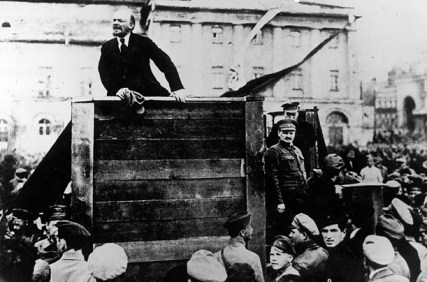“…what occurred in October 1917 [7th November Gregorian calendar] was a classical modern coup d’état accomplished without mass support. I was a surreptitious seizure of the nerve centres of the modern state, carried out under false slogans in order to neutralise the population at large, the true purpose of which was revealed only after the new claimants to power were firmly saddle. (….)
The population at large offered little resistance at a time when such resistance would have made all the difference because it believed that the new regime could not last. The so-called Soviet government was seen as suddenly as made up by crazy utopians who would be swept from the scene as suddenly as they had appeared.
When Bolshevik policies began to affect adversely the interests of workers and peasant – the former through the liquidation of “worker control” and independent trade unions, the latter through ruthless food exactions – they rebelled. The years 1920-21 witnessed massive resistance to the new regime.
As the historian Vladimir Brovkin has demonstrated, the true civil war started only after the White armies had been crushed. It was a war pitting millions of peasants against millions of Red Army troops, in which hundreds of thousands perished. But by then it was too late. The mutinous sailors of Kronshdat, the striking workers of Petrograd, and the peasant partisans of Tambov or Siberia had no more chance to defeating the government than, in tsarist days, the rebeles led by Stepan Razin or Emelian Pugachev.
Still, the acquisition of power in this manner had its own logic, of which the Bolsheviks were only dimly aware.
By imposing on the country minority rule and refusing to consider yielding or even sharing power, they laid down the foundations of totalitarianism. Lenin had genuinely believed that, once the “counterrevolution” had been smashed, popular democracy would triumph. But when the “counter-revolution” turned out to be not only a relatively thin layer of dispossessed landowner, bourgeois, and official, but the great majority of the Nation, as los as he was unwilling to give up power, he had no choice but to resort an exceedingly repressive regime.
His erratic behaviour in 1921 and 1922 can be in large measure explained by the dismay he felt at so many things going wrong: as he once put it, the driver steers the car in one direction and the car goes “God knows where”. Because he refused to surrender the steering-wheel, he willy-nilly created conditions which made inevitable the rise of power of a personal dictator, who turned out to be ruthless than he.”
Three “whys” of the Russian Revolution (1995). Richard Pipes
Fragment of Chapter Two: Why Did the Bolsheviks Triumph?
What occurred by Manuel Fraga is licensed under a Creative Commons Attribution 4.0 International License.


One thought on “What occurred”